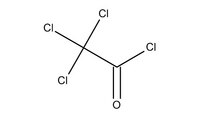808391 Sigma-Aldrich氯化三氯乙醯
Trichloroacetyl chloride for synthesis. CAS 76-02-8, EC Number 200-926-7, chemical formula CCl₃COCl.
More>> Trichloroacetyl chloride for synthesis. CAS 76-02-8, EC Number 200-926-7, chemical formula CCl₃COCl. Less<<Synonyms: Trichloroacetic acid chloride
Recommended Products
Overview
| Replacement Information |
|---|
Key Spec Table
| CAS # | EC Number | Hill Formula | Chemical Formula | Molar Mass |
|---|---|---|---|---|
| 76-02-8 | 200-926-7 | C₂Cl₄O | CCl₃COCl | 181.83 g/mol |
Products
| Catalogue Number | Packaging | Qty/Pack | |
|---|---|---|---|
| 8.08391.0100 | 玻璃瓶 | 100 ml | |
| 8.08391.0250 | 玻璃瓶 | 250 ml |
| Description | |
|---|---|
| Catalogue Number | 808391 |
| Synonyms | Trichloroacetic acid chloride |
| Description | Trichloroacetyl chloride |
| References |
|---|
| Product Information | |
|---|---|
| CAS number | 76-02-8 |
| EC number | 200-926-7 |
| Hill Formula | C₂Cl₄O |
| Chemical formula | CCl₃COCl |
| Molar Mass | 181.83 g/mol |
| HS Code | 2915 90 90 |
| Structure formula Image | |
| Quality Level | MQ200 |
| Applications | |
|---|---|
| Application | Trichloroacetyl chloride for synthesis. CAS 76-02-8, EC Number 200-926-7, chemical formula CCl₃COCl. |
| Biological Information |
|---|
| Dimensions |
|---|
| Materials Information |
|---|
| Toxicological Information | |
|---|---|
| LD 50 oral | LD50 Rat 600 mg/kg |
| Safety Information | |
|---|---|
| Categories of danger | very toxic, corrosive |
| Product Usage Statements |
|---|
| Storage and Shipping Information | |
|---|---|
| Storage | Store below +30°C. |
| Packaging Information |
|---|
| Supplemental Information |
|---|
| Specifications | |
|---|---|
| Assay (morpholine method) | ≥ 96.0 % |
| Density (d 20 °C/ 4 °C) | 1.616 - 1.621 |
| Identity (IR) | passes test |
| Global Trade Item Number | |
|---|---|
| Catalogue Number | GTIN |
| 8.08391.0100 | 04022536400020 |
| 8.08391.0250 | 04022536400037 |
Documentation
氯化三氯乙醯 MSDS
| Title |
|---|
氯化三氯乙醯 Certificates of Analysis
| Product Number | Packaging | Specification | Lot Number |
|---|---|---|---|
| 8.08391.0100 | 玻璃瓶 | PDF Specification Document | |
| 8.08391.0250 | 玻璃瓶 | PDF Specification Document |









